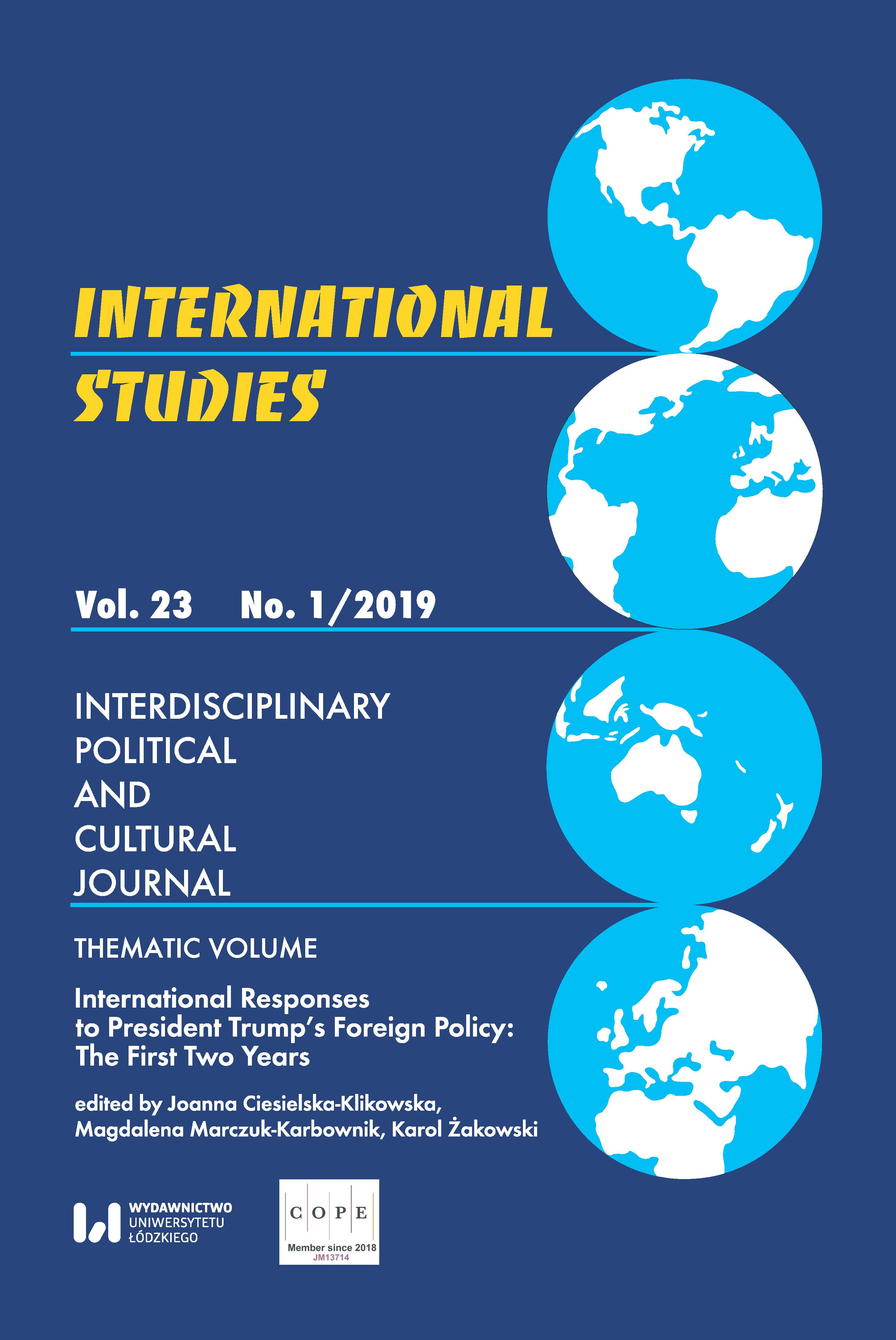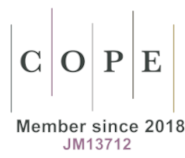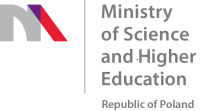Heterogeneity of the Notion of Interest in Accordance with the International Relations Theory: A Study of Russia’s National Interests
DOI:
https://doi.org/10.18778/1641-4233.23.15Keywords:
national interest, theory of international relations, Russia’s foreign policy, the annexation of the CrimeaAbstract
The category of a national interest is one of the most popular notions used in international relations. It has a polysemic character and is differently interpreted by various scientific perspectives. The purpose of this article is to provide a brief analysis of selected approaches of the theory of international relations to defining interests and correlating the interpretations of national interests of the Russian Federation performed on their bases. The choice of case study concerning the foreign policy of the Russian Federation is not accidental because in countries aspiring to gain world power the concept of national interest is raised while explaining the motives of decisions taken by their leaders exceptionally often. In this article, Russia’s interests will be discussed in reference to the annexation of the Crimea and Russia’s actions towards Ukraine. Those events vividly show the specificity of defining the national interests, based on one hand on the pursue to being a powerhouse and understanding the interests in the category of power and, on the other hand, resulting from the political identity of Russian elites. As a result, an assessment of the scientific utility of selected theoretical paradigms and their use in the analyses of Russia’s foreign policy will be outlined.
Downloads
References
Arbatov, A. Pochemu my ne ponimaem drug druga?”. “Voenno-promyshlenny Kurier”, no. 28(344), 2010.
Google Scholar
Areshev, A. DOVSE. Ustarevshii Dogovor i Novye Realii. “Mezhdunarodnaia Zhizn”, no. 12, 2007.
Google Scholar
Baker, P. Pressure Rising as Obama Works to Rein In Russia. “The New York Times”, 2.03.2014.
Google Scholar
Beom, S.S. Russia‘s Perspectives on International Politics: A Comparison of Liberalist, Realist and Geopolitical Paradigms. “Acta Slavica Iaponica”, no. (26), 2007.
Google Scholar
Bogaturov, A. Kontrrevolutsiia tsennostei i mezhdunarodnaia bezopasnost. “Mezhdunarodnyie Protsessy”, no. 8(324), 2010.
Google Scholar
Bordachev, T. The limits of rational choice Russia in Global Affairs, 4 October 2008.
Google Scholar
Burchill, S. The National Interest in International Relations Theory. London, 2005.
Google Scholar
DOI: https://doi.org/10.1057/9780230005778
Carr, E.H., The Twenty Years’ Crisis, 1919–1939. New York: Perennial, 2001.
Google Scholar
Chazbijewicz S. Adwet czyli powrót. Walka polityczna Tatarów krymskich o zachowanie tożsamości narodowej i niepodległość państwa po II wojnie Światowej.Olsztyn, 2001.
Google Scholar
Clunan, A. The Social Construction of Russia’s Resurgence: Aspirations, Identity, and Security Interests. Baltimore MD: The Johns Hopkins University Press, 2009.
Google Scholar
Cox, R. Social Forces, States, and World Orders: Beyond International Relations Theory. “Millennium: Journal of International Studies”, no. 10, 1981.
Google Scholar
Donnelly, J. Realism and International Relations. Cambridge: Cambridge University Press, 2000.
Google Scholar
DOI: https://doi.org/10.1017/CBO9780511612510
Finnemore, M. National Interests in International Society. New York, 1996.
Google Scholar
DOI: https://doi.org/10.7591/9781501707384
Gilpin, R. War and Change in World Politics. New York: Cambridge University Press, 1981.
Google Scholar
DOI: https://doi.org/10.1017/CBO9780511664267
Gostkiewicz, M. Dwa obozy, które mówią różnymi językami. Jak Rosja i Zachód bawią się w propagandowy głuchy telefon. „Gazeta Wyborcza”, 28 March 2014.
Google Scholar
Hall, R.B. Moral Authority as a Power Resource. “International Organization”, no. 51(4), 1997.
Google Scholar
DOI: https://doi.org/10.1162/002081897550465
Hamilton, College Levitt Poll. The Russian Elite 2016. Web. https://www.hamilton.edu/documents/russian%20elite%202016%20final%20ppt.pdf
Google Scholar
Hopf, T. Crimea is ours: A discursive history. “International Relations”, no. 30(2), 2016.
Google Scholar
DOI: https://doi.org/10.1177/0047117816645646
Hopf, T. Social Construction of International Politics: Identities & Foreign Policies, Moscow, 1955 and 1999. London: Cornell University Press, 2002.
Google Scholar
Jusufaj, E. The Kosovo Precedent in the Secession and Recognition of Crimea. “ILIRIA International Review”, 01, 2015.
Google Scholar
DOI: https://doi.org/10.21113/iir.v5i1.20
Kapuśniak, T. Ukraina jako obszar wpływów międzynarodowych po zimnej wojnie, Warsaw, 2008.
Google Scholar
Karaganov, S. Lucky Russia. Russia in global affairs. 23 March 2011. Web. http://eng.globalaffairs.ru/pubcol/Lucky-Russia-15154
Google Scholar
Kelly, L., Carbonnel Alissa de. Russian markets plunge as Putin tightens Crimea grip. Web. http://www.reuters.com/article/2014/03/03/us-ukraine-crisis-idUSBREA1Q1E82014030
Google Scholar
Keohane, R.O. Joseph S. Nye, Power and Interdependence. New York, 2001
Google Scholar
Kropatcheva, E. Russian Foreign Policy in the Realm of European Security through the Lens of Neoclassical Realism. “Journal of Eurasian Studies”, no. 3, 2012.
Google Scholar
DOI: https://doi.org/10.1016/j.euras.2011.10.004
Levada Center Poll. Russia’s role in the world. Web. 25 March 2015, https://www.levada.ru/en/2015/03/25/russia-s-role-in-the-world
Google Scholar
Levada Center Poll. Sankcii: ocenki i ożydanija. Web. 28 August 2014, http:levada.ru/2014/08/28/sanktsii-otsenki-i-ozhidaniya/
Google Scholar
Lobell, S.E., Ripsman, N.M, Taliaferro, J.W. (eds.). Neoclassical realism, the State, and foreign policy. Cambridge: Cambridge University Press, 2009.
Google Scholar
DOI: https://doi.org/10.1017/CBO9780511811869
Makarychev, A. Russia, Ukraine and the Eastern Partnership: From Common Neighborhood to Spheres of Influence? “Insight Turkey”, no. 16(3), 2014. Web. http://file.insightturkey.com/Files/Pdf/russia-ukraine.pdf
Google Scholar
Moravscik, A. Taking Preferences Seriously: A Liberal Theory of International Politics. “International Organization”, vol. 51, no. 4, 1997.
Google Scholar
DOI: https://doi.org/10.1162/002081897550447
Morgenthau, H.J. Politics Among Nations: The Struggle for Power and Peace. New York: Knopf, 1985.
Google Scholar
Murray, R. The Return of the Problem-Solvers. Web. http: e-ir.info/2014/03/19/the-return-of-the-problem-solvers/
Google Scholar
Primakov, Y. Rossiya ishchet novoe mesto v mire. “Izvestiya”, 6 March 1996.
Google Scholar
Putin, V. Address by President of the Russian Federation. 18.03.2014. Web. http://en.kremlin.ru/events/president/news/20603
Google Scholar
Putin, V. Putin deplores collapse of USSR. “BBC News”. Web. 25. April 2005, http://news.bbc.co.uk/2/hi/4480745.stm
Google Scholar
Putin, V. Reception to Mark 1000 Years since the Death of St. Vladimir, Equal-to-the-Apostles. Web. 28 July 2015, http://en.kremlin.ru/events/president/news/50068
Google Scholar
Putin, V. Vladimir Putin has been Sworn in as President of Russia. Web. 7 May 2018, http://en.kremlin.ru/events/president/news/57416
Google Scholar
Ruggie, J.G. Constructing the World Polity: Essays on International Institutionalization. London, 1998.
Google Scholar
Russian National Security Strategy. Web. December 2015, http://www.ieee.es/Galerias/fichero/OtrasPublicaciones/Internacional/2016/Russian-National-Security-Strategy-31Dec2015.pdf
Google Scholar
Sadłocha, J. Krytyczna analiza kategorii interesu w teorii stosunków międzynarodowych. Wrocław, 2015.
Google Scholar
Schweller, R.L., Deadly Imbalances: Tripolarity and Hitler’s Strategy of World Conquest. New York, 1998.
Google Scholar
Shea, A. Ukraine: Putin’s postmodern moment and the politics of truth. Web. 11 March 2014, http://conflictandsecurity.com/blog/ukraine-putins-postmodern-moment-and-the-politics-of-truth
Google Scholar
Singer, J.D., The Level-of-Analysis Problem in International Relations, [in:] K. Knorr and S. Verba (eds.)., The International System: Theoretical Essays. New York, 1961.
Google Scholar
Slobodchikoff, M.O., Douglas Davis, G. Roots of Russian Soft Power: Rethinking Russian National Identity. “Comparative Politics Russia”, no. 2, 2017.
Google Scholar
DOI: https://doi.org/10.18611/2221-3279-2017-8-2-19-36
Strategiya natsional’noy bezopasnosti Rossiyskoy Federatsii do 2020 goda. Web. 12 May 2009, http://www.kremlin.ru/supplement/424
Google Scholar
Tsygankov, A. Russia’s Foreign Policy: Change and Continuity in National Identity. New York: Rowman & Littlefield, 2010.
Google Scholar
Tsygankov, A. Russia’s Power and Alliances in the 21st century. “Politics”, no. 30(4), 2010.
Google Scholar
DOI: https://doi.org/10.1111/j.1467-9256.2010.01392.x
Vasquez, J. The Power of Power Politics: From Classical Realism to Neotraditionalism. Cambridge: Cambridge University Press, 1998.
Google Scholar
Waltz, K. Struktura teorii stosunków międzynarodowych. Warsaw: Scholar, 2010.
Google Scholar
Weldes, J. Constructing National Interests: the United States and the Cuban missile crisis. Minnesota: University of Minnesota Press, 1999.
Google Scholar
Wendt, A. Anarchy is what States Make of it: The Social Construction of Power Politics. “International Organization”, vol. 46, no. 2, 1992.
Google Scholar
DOI: https://doi.org/10.1017/S0020818300027764
Wendt, A. Social Theory of International Politics. Cambridge: Cambridge University Press, 1999.
Google Scholar
DOI: https://doi.org/10.1017/CBO9780511612183
Wielomski, A. Putinowska inna rzeczywistość. Web. http://www.konserwatyzm.pl/artykul/11851/putinowska-inna-rzeczywistosc
Google Scholar
Wierzbowska-Miazga, A. Konsekwencje aneksji Krymu. Ośrodek Studiów Wschodnich, Web. 19 March 2014, http://www.osw.waw.pl/pl/publikacje/analizy/2014–03–19/konsekwencje-aneksji-krymu
Google Scholar
Williams, M. The Realist Tradition and Limits of International Relations. Cambridge: Cambridge University Press, 2005.
Google Scholar
DOI: https://doi.org/10.1017/CBO9780511491771
Wohlforth, W.C., The Elusive Balance: Power and Perceptions During the Cold War. Ithaca, 1993.
Google Scholar
DOI: https://doi.org/10.7591/9781501738081
Downloads
Published
How to Cite
Issue
Section
License

This work is licensed under a Creative Commons Attribution-NonCommercial-NoDerivatives 4.0 International License.

















